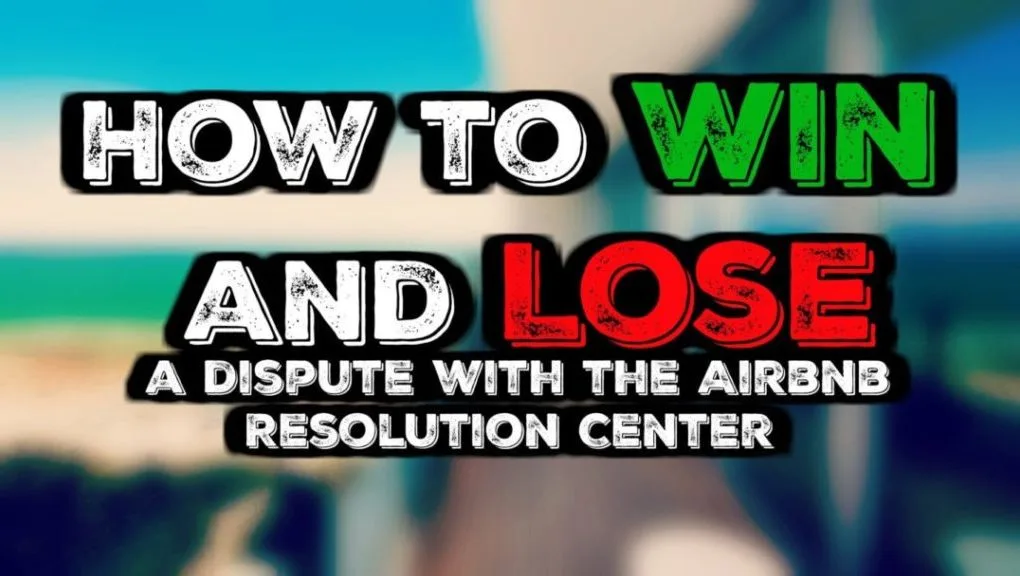Our Airbnb host initiated a dispute with us, and unfortunately, we couldn’t reach a resolution. Consequently, we had to resort to the Airbnb Resolution Center (ARC). Our stay in Croatia involved renting an apartment through Airbnb for 28 nights. Following our departure, the host contacted us, seeking payment for property damages.
In the following account, we share our journey through the Airbnb dispute process, detailing the steps we took to emerge victorious. Additionally, we offer valuable tips to enhance your chances of winning your Airbnb dispute and provide suggestions for future reservations.
While we’ve focused on our experience as guests, it’s important to recognize that both parties in a dispute have valid perspectives. In the following sections, we’ll share strategies we’ve successfully used as guests to resolve disputes, as well as offer insights for hosts to effectively present their cases. Our goal is to provide a balanced view that can benefit all Airbnb users involved in the dispute resolution process.
How to Win an Airbnb Dispute With the Airbnb Resolution Center
Here, we’ll delve into our experience in a comprehensive format. It’s important to note that the insights shared here serve as a guide for both hosts and guests. By exploring our journey, you’ll gain valuable insights into the essential steps to secure success in your Airbnb dispute through the ARC.
The Complaint – A Damaged Couch
The stay, for the most part, was pleasant. Like many of our previous Airbnb experiences, there were a few inconveniences. When you travel as much as we do, you learn to adapt quickly to the various living standards and lifestyles that locals are accustomed to.
The issue began when we arrived at our next unit in Montenegro. We received a message (through Airbnb) from the previous apartment host (from Croatia) that she was about to open an Airbnb dispute, it stated:
Correspondence #1 – Host
Audrey looked at me and said, “We did not break that couch.” [The couch looked something like this.] After staying in over 100 Airbnb rentals we never incurred any type of accusation like this one. Although we’ve dealt with numerous appliances breaking during our stay, we’ve never been accused of damaging anything.
We always treat the units we stay in as if they were our own. In fact, we’re what many would consider clean freaks. We take great pride in the fact that we are often commended by hosts that their apartments are cleaner after our departure!
Our track record and reviews were glowingly positive and this helped show that we are trustworthy and responsible guests. However, we do realize some Airbnb hosts are looking to make easy money.
The Absolute #1 Lesson Is to Make Sure All Communication Is Documented Throughout the Entire Stay.
When it comes to an Airbnb dispute, you never know what evidence or documentation you may need to prove your case later on. It’s highly recommended that you use the Airbnb message application on their site/app to communicate because it allows Airbnb employees quick access to the email trail/evidence.
Host Mistakes
The two big mistakes the host made with this initial email were that they stated:
- It could have happened to anyone.
- The amount of how much the couch was going to cost to fix.
The first statement indicates that it was a simple mistake. In regards to the second statement in question, which we received the same day of departure, the host stated a specific number ($70) on how much it would cost to fix the couch. The quote was obviously a fictitious amount made up by the host to provide some sort of emotional and financial pacification to the damage. Both statements damaged her case in the Airbnb dispute process.
One day later, the host requested $220 through the Airbnb Resolution Center!
To quote two different amounts in such a short amount of time delegitimizes the host’s claim and suggests an ulterior motive, such as extortion.
Guest Lesson
When receiving an accusation of damage in an Airbnb dispute, take it very seriously. Do not simply quickly respond with a blanket denial. You will need to begin to lay out a case/argument as to why this damage is not your fault and provide it to the Airbnb Resolution Center.
From a defensive perspective, remember, you never have to prove anything. Of course, if you can prove it wasn’t your fault, do so! If you aren’t able to prove it though, remember, just like any defense case you will need to create and display inaccuracies, inconsistencies, and irresponsibility on the part of the owner. In other words, you’ll need to illustrate (to Airbnb) why the owner’s word is questionable.
Correspondence #1 – Guest
Audrey is telling me that the couch was initially wobbly and over the month it may have gotten worse. That couch has got to be close to 20 years old. We’re quiet people and by no means did we engage in any kind of activity that would have damaged the couch so instantaneously.
We only sat on it. This must have been from regular wear and tear. If you’re getting quoted $70 to fix it, that sounds exorbitant. We do feel somewhat obligated because it did seem to get worse under “our watch.” We can give you $10 to cover parts if that helps.
In all fairness, you never told us proactively about:
- How loud the street noise is (when we were specifically looking to rent somewhere quiet).
- The toilet seat was broken our entire stay, even though you knew it was broken before we agreed to rent (you even told us after our first day in the unit that you were going to get it fixed).
- How the flooring was improperly installed and bubbled up during our stay (which could have caused a serious personal injury).
- The smell of sewage coming from the drain in the bathroom, which was trying to be covered up with the placement of the rug and plugin air fresheners (which also can cause severe health issues and/or an explosion/fire).
Guest Lesson
- If you can’t completely prove that you’re not 100% responsible, try to create the notion that you’re not fully or only partially responsible.
- Try to create the notion that the item that was damaged was extremely old. Explain how you used the item that broke in a normal manner, and use the term “wear and tear” to illustrate that the damage was not done ALL by you.
- Provide a counteroffer in an amount you feel comfortable with (to make this all go away). You’re giving the perception that you’re trying to meet the host halfway.
- Provide other items that were dirty, broken, old, or not working properly during your stay. This will create the perception that the unit is not well maintained. Always stick with facts. Never get personal.
Correspondence #2 – Host
I’m very sorry for having this conversation but I must say that you are not telling the truth. You completely destroyed the couch like you were using ax or something, from both sides, you dismantled it by breaking the parts and wood where the sides are holding together. This could not happen just while sitting on it. The couch is 4 years old. I need a new one now and you caused me a problem (a plate is missing too).
I didn’t want to come and search you at the main bus station not to embarrass you. As for your compensation of $10, I really don’t know how people who travel the world can even make such an offer. The things you mentioned above are things I tried to resolve as soon as you told me. You never told me anything about the noise and about the flooring. I did not have time to fix the toilet seat as I was on a business trip during most of your stay in Croatia. The advice is, to be honest first with yourself and then with others.
Host Mistakes
- Never apologize.
- Never accuse the other party of lying. This is an emotional response and can be very hard to prove. It will further delegitimize your claim.
- From the first correspondence to the second correspondence, the host went from stating that the damage was essentially a simple mistake to “completely destroyed the couch like you were using an ax or something.” This statement creates a huge inconsistency.
- The host stated how old the couch in question was. This quickly brings depreciation into question. Never bring the age of an item into play. Only discuss what the item costs you.
- Never admit that something (other than the damaged item in question) was broken and that the renter notified you, and you still didn’t fix it because you were too busy.
- Most importantly, again, stick with the facts and do not get personal.
Correspondence #2 – Guest
I’m confused and I’m beginning to think you have selective memory. You initially said that it can be repaired for $70 and now you’re stating that you need a whole new couch? And then you have the audacity to tell me that I’m the one not telling the truth.
Also, what does my traveling the world have anything to do with this? It sounds like you’re trying to extort money from me. Where did the $70 quote come from? Is this your personal quote? Did a reputable furniture repair company make it?
In regards to the damage, we’re only aware of the loose armrest nearest the window. The couch was bought used, correct? That does not look anything like a 4-year-old couch.
Your ax comment seems excessive. My point is that you never told us about the noise and the flooring. – You conveniently decided not to tell us.
Other Issues
- Before we booked the unit you knew the toilet seat was broken AND you knew there was a sewage leakage problem because you knew exactly where the smell was coming from. – it was trying to be covered up by a rug and air freshener.
- In terms of the toilet seat, I even offered to fix it for you. I just asked for parts reimbursement. Your solution/excuse to the problem is for me to sit on a broken toilet seat for 30 days because you’re on a business trip.
- We occasionally have issues with hosts on Airbnb that try to take advantage of us. We are paying for a service and expect to receive a certain level of comfort and quality. 95%+ of our reviews are extremely positive. As of now, I feel like you’re trying to threaten me AND extort money from me.
Couch Was Used
I would have been more than happy to partially reimburse you for a portion of the expense (which I previously stated) but you’re:
- Going about this very unprofessionally.
- Sending me mixed messages about the damage. Initially, you said it was $70 worth of damage and now in the latest message you’re telling me you need a brand-new couch.
- Using your knowledge of me as a world traveler against me as a way to extort funds from me.
- Trying to get me to pay for damage to a couch that you purchased over 4 years ago and which has most likely fully depreciated AND was probably bought used?
Guest Lesson
- Try to create inconsistencies on how much the damaged item would cost to fix or replace.
- Use the term, “extort” or “extortion” if you feel the host is increasing the damages due amount or the amount doesn’t seem practical.
- Address any personal attacks the other party made and illustrate the irrelevance.
- Attempt to get more information on the age of the item in question. The older the item, the less value it has due to depreciation and age.
- Explain the inconsistencies the owner is providing.
- Describe any other maintenance issues in the unit, (e.g., mold, electricity issues (flickering of lights/blowing fuses), plumbing odors/issues, etc. It shows an overall lack of maintenance, care, and engagement—this is one of the best ways to make sure you win your Airbnb dispute.
Alternatives for Airbnb
To find the best housing option for yourself view all reviews and compare prices in advance, you can use these platforms:
Where to find the best alternative accommodations?
Airbnb Resolution Center
At this point in the dialogue, it was fairly evident that neither party was going to agree. Whether you’re the host or guest, as soon as you believe there will be no resolution you must file an Airbnb dispute as soon as possible with the Airbnb Resolution Center (ARC).
This will give the impression that you’re the one who suffered the loss and provide slightly more clout. At the bare minimum contact Airbnb and bring them up to speed on the circumstances, ask for advice, and plead your case.
Airbnb will review the message chain and any other documentation provided. The message chain will act as a deposition transcription to determine facts and fallacies between the two parties.
It’s important to communicate any issues big or small during the stay so that they appear in the message history. Airbnb will review the information provided by the host or guest, before making a final decision.
Hosts – How to Win
Below are a few quick tips for hosts on how to win the Airbnb dispute process:
- Attempt to negotiate with guests without getting Airbnb involved.
- Contact Airbnb within 24 hours of guest departure.
- Provide specific details on what was damaged. Include photos and/or video along with receipts, invoices, written estimates, or links to comparable items denoting actual cash value for repair or replacement. Do not make up a replacement/repair amount yourself. A third party (or receipt) should be included to provide this amount. Provide the amount and do not change it going forward.
- Join the Airbnb Host Protection Insurance program beforehand (make sure to read the fine print so you understand what’s covered). There are some limitations to the program and the host should fully understand what’s covered before signing up. The program protects against liability claims up to $1 million that occur in a listing, or on an Airbnb property, during a stay.
- Add or increase the security deposit amount (beforehand) on the listing.
- Show and display a high level of engagement with the guests and the property. We find that the most engaged hosts offer the best stays with the least amount of negative issues.
Guests – How to Win
Below are a few quick tips for guests on how to win the Airbnb dispute process:
- Attempt to negotiate with the host without getting Airbnb involved.
- Have a good track record. Take great pride in your reviews.
- Create a logical explanation as to why the damage was not created by you or is not your responsibility. Use the lessons above to make the greatest impact.
- Provide Airbnb with inconsistencies, inaccuracies, and irresponsibility on the part of the host.
Guests – What to Include in Your Support to Airbnb?
In rebuttal to the Airbnb dispute, we typed up a formal letter to Airbnb that was two pages, single-spaced. It was quite a lengthy document. To illustrate, below is an outline of the content that we provided (to Airbnb) with subject headers and some key talking points of the components below.
- Were they rushed?
- Did anyone walk you through the unit?
- Discuss any issues with the unit that the host informed you about upfront.
- Safety concerns you observed or noticed, e.g., bars over windows, no smoke detectors, etc.
INITIAL IMPRESSIONS OF THE UNIT
- Cleanliness or lack of within the unit.
- Noises, e.g., construction, noisy neighbors.
- Smells strategically placed air fresheners.
INVENTORY CHECKLIST OF THE UNIT
- Any essentials that were not provided.
- Cleaning supplies not included, e.g., dish soap, mop, broom, etc.
PROBLEMS INCURRED DURING THE STAY
- Describe ALL issues you had during the stay that were NOT perfect.
- Highlight any issues that you notified the host about and were never corrected/fixed.
CHECKOUT PROCESS
- If the host picked up the keys and was physically in the apartment, explain here.
- Describe any discrepancies in the placement of the damaged item. Perhaps the owner moved the item and caused the damage?
EXTORTION
- Did the host quote more than one replacement price?
- Did the host refer to your financial capabilities?
CONCLUSION
- Question the overall safety of the unit.
- Provide a final argument summary.
- Bring to attention the good reviews you received in the past.
Legal Considerations
While most disputes can be resolved through Airbnb’s Resolution Center, in some cases, legal action may be necessary. If the dispute involves a significant amount of money or serious allegations, it may be wise to consult with a lawyer who specializes in short-term rental issues.
Remember that Airbnb’s Terms of Service include an arbitration clause, which may limit your ability to pursue legal action in some jurisdictions.
Alternative Dispute Resolution Methods
If the Airbnb Resolution Center doesn’t provide a satisfactory outcome, consider these alternatives:
Direct Negotiation Alternatives
Try to reach an agreement directly with the other party.
- Third-party mediation services: Some companies specialize in vacation rental disputes.
- Small claims court: For disputes involving smaller amounts of money.
- Credit card chargeback: As a last resort, guests might consider disputing the charge with their credit card company.
Success Rates
While Airbnb doesn’t publish official statistics on dispute resolution outcomes, unofficial reports suggest that about 60-70% of disputes are resolved in favor of the party who provides the most compelling evidence and documentation.
Cultural Considerations
When traveling internationally or hosting international guests, be aware that cultural differences can impact communication and expectations. What’s considered normal in one culture might be offensive in another. Being patient, open-minded, and willing to explain your perspective can help bridge cultural gaps and prevent misunderstandings that could lead to disputes.
Feedback Process
After your dispute is resolved, Airbnb provides an opportunity to give feedback on the process. This feedback is crucial for improving their services. You can:
Rate your experience with the Resolution Center
Provide detailed comments on what worked well and what could be improved
Suggest new features or policies that could help prevent similar issues in the future
What is the Airbnb Resolution Center?
The Airbnb Resolution Center lets you request or send money for things related to your Airbnb trip, including an Airbnb dispute. For instance, to open a refund or payment request, go to airbnb.com/resolutions. Furthermore, if you’re unable to reach an agreement, you can ask Airbnb to make the final decision 72 hours after the request is opened.
When you involve Airbnb, the Airbnb team will be notified and a team member will be assigned to your case. Also, they’ll review the information provided by you and your host or guest, before making a final decision. In some cases, Airbnb may need to contact you to gather additional information, before they can make a decision.




